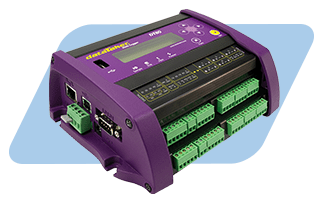dataTaker DT80 Helps Prove Product Outperformed the Competition
 CAS DataLoggers provided the data logging solution of fuel consumption monitoring for a company called FPC International, specializing in a diesel fuel additive widely used in tankers, trucks, and trains all over the world to save on fuel and engine maintenance costs while reducing carbon footprints and emissions. Rather than just making claims of their product’s benefits, FPC Intl. actively tested and documented its results, making all of their testing available online for customer review. The company’s current project was located in a productive gold mine in Sonora, Mexico. The mine’s owners used 60 rock trucks with Caterpillar 789C diesel engines to haul the gold ore out, and FPC arranged a demonstration including a series of fuel tests to show the owners the benefits of switching from the additive they were currently using. FPC engineers, therefore, had a need for a powerful yet cost-effective data logging solution with the flexibility needed to measure the engines’ horsepower output and fuel consumption of the rock trucks during brake-specific fuel consumption monitoring testing. This intelligent solution would also need to support versatile communications options, particularly USB data transfer for convenient onsite demonstration to the customer.
CAS DataLoggers provided the data logging solution of fuel consumption monitoring for a company called FPC International, specializing in a diesel fuel additive widely used in tankers, trucks, and trains all over the world to save on fuel and engine maintenance costs while reducing carbon footprints and emissions. Rather than just making claims of their product’s benefits, FPC Intl. actively tested and documented its results, making all of their testing available online for customer review. The company’s current project was located in a productive gold mine in Sonora, Mexico. The mine’s owners used 60 rock trucks with Caterpillar 789C diesel engines to haul the gold ore out, and FPC arranged a demonstration including a series of fuel tests to show the owners the benefits of switching from the additive they were currently using. FPC engineers, therefore, had a need for a powerful yet cost-effective data logging solution with the flexibility needed to measure the engines’ horsepower output and fuel consumption of the rock trucks during brake-specific fuel consumption monitoring testing. This intelligent solution would also need to support versatile communications options, particularly USB data transfer for convenient onsite demonstration to the customer.
Installation
FPC International installed a dataTaker DT80 Intelligent Universal Data Logger in a ruggedized Pelican case in the rock truck under test, inside the cabin right behind the driver’s seat.
 The logger was powered directly from the vehicle battery. The DT80 data logger was then connected to sensors acquiring the necessary data, including 2 flow meters with pulse signal output. During the brake-specific fuel consumption test, the dataTaker DT80 counted pulses from the flow sensors and calculated the fuel flow rate as well as totalized the fuel consumption over the test interval. RTD sensors directly connected to the DT80 were used to measure and record engine temperature. To measure horsepower, they connected the data logger to a tachometer measuring the RPM of the motor and the sophisticated calculation capacity of the DT80 recorded the resulting horsepower.
The logger was powered directly from the vehicle battery. The DT80 data logger was then connected to sensors acquiring the necessary data, including 2 flow meters with pulse signal output. During the brake-specific fuel consumption test, the dataTaker DT80 counted pulses from the flow sensors and calculated the fuel flow rate as well as totalized the fuel consumption over the test interval. RTD sensors directly connected to the DT80 were used to measure and record engine temperature. To measure horsepower, they connected the data logger to a tachometer measuring the RPM of the motor and the sophisticated calculation capacity of the DT80 recorded the resulting horsepower.
Usage
Using these parameters, the test project first measured the efficiency of the truck under test running on its usual fuel, then measured the truck’s efficiency again using FPC’s own fuel additive, and afterward measured the difference between the two.
The dataTaker DT80 low power data logger offered 5 to 15 universal analog sensor inputs and 12 digital channels. The stand-alone logger recorded the test’s measurements with 18-bit resolution and a ±50 V input measurement range, featuring a dual channel concept enabling up to 10 isolated or 15 common referenced analog inputs to be used in any combination. The data logger also featured a built-in display and wide operating temperature range. High-speed counter inputs, phase encoder inputs and a programmable serial sensor channel allowed the DT80 to easily connect to most sensors and data measurement sources. Temperature, voltage, current, 4-20mA loops, resistance, bridges, strain gauges, frequency, digital, serial and calculated measurements could all be scaled, logged and returned in engineering units or using statistical reporting. Operators could also group sample, log, alarm and control tasks within schedules to fit their needs.
Data management was equally convenient, with the data logger storing up to 10 million data points in non-volatile memory so that the engineers could log as much or as little as needed. Data transfer via the logger’s extensive communications array included Ethernet, RS-232 communication with PC, and a USB memory slot. After each phase of fuel consumption testing, FPC allowed the mine’s personnel to unload the data using the DT80’s USB stick port. This allowed the engineers to use their own onsite equipment to view the comparative data for themselves, thus preventing any claims that the tests had been biased in any way.
Additionally, dataTaker’s dEX graphical interface was included free of charge with the datalogger. This user-friendly, browser-based software came pre-installed and enabled quick setup and configuration of the data logger. Suitable for both novice and advanced users, dEX was run directly from a web browser, accessible either locally or remotely over the Internet. Operators could use any of the logger’s built-in communications ports to view dEX, including Ethernet, USB.
Benefits
FPC International benefitted decisively from installing the dataTaker DT80 Intelligent Universal Input Data Logger in its fuel consumption monitoring test program. The data logger had the versatility to measure all the necessary parameters needed to prove that the company’s product was more efficient than the mine’s existing additive. Data accessibility was a snap: conducting the tests and delivering the USB data in front of the customer strongly reinforced the test’s results and substantiated the company’s claims to a better product.
Chris Riegel, an engineer at FPC International, explained: “It was extremely straightforward to use the dataTaker, and one of the best things we liked about the logger is that it let us quickly get set up onsite and then just let the people there retrieve all the data themselves using the USB memory stick. This feature let us avoid any concerns that we, as providers of the fuel additive, were manipulating the data. That really helped us to prove our point that our product outperformed the competition, and in fact, we were able to demonstrate a superior effectiveness of nearly 10%.” FPC Intl. is currently using dataTaker products in a subsequent fuel testing project following the success of the demonstration in the mine.
For further information on the dataTaker DT80 Intelligent Universal Input Data Logger, other dataTaker data loggers, fuel consumption monitoring, or to find the ideal solution for your application-specific needs, contact a CAS Data Logger Application Specialist at (800) 956-4437 or request more information.

